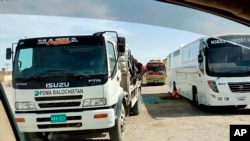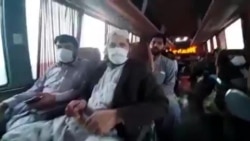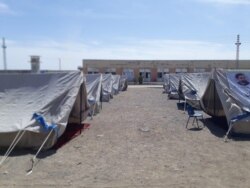Iran’s growing coronavirus outbreak has triggered more angst in the country, preventing thousands of visiting Pakistanis from returning home and fueling fears of contagion in prisons.
At least 5,000 Pakistanis have been stuck in Iran since authorities in the Pakistani province of Baluchistan closed the border with their western neighbor Sunday, according to a provincial government spokesman who spoke to VOA Deewa. In a Monday phone interview, Liaquat Shahwani said the stranded Pakistanis include Shiite pilgrims, traders and other visitors.
A group of stranded Pakistani traders expressed concern about their plight in several videos that they apparently filmed Monday and sent to VOA Deewa as they were taking a bus toward the Iran-Pakistan border. VOA could not independently verify the authenticity of the clips.
In one video, a Pakistani man who identified himself as Haji Taj Mohammad Malakhel from the city of Quetta said he was among 17 businessmen on the bus ride from Isfahan in central Iran to Zahedan in the southeast. He said they decided to try to go home due to concerns about the coronavirus spreading in Isfahan, where Iranian authorities have confirmed two cases.
Another video of the bus ride showed a view of the road outside. It appeared to have been filmed on an eastbound road in Isfahan province, probably near the town of Toodeshk.
“We appeal to Pakistan’s prime minister and Baluchistan’s chief minister to accommodate us at the border with Iran,” Malakhel said. “Iranian authorities say we can leave [Iran] when Pakistan gives them permission [to let us cross the border], so kindly let us go back to our homes because our children, brothers and sisters are waiting for us in Quetta.”
Baluchistan’s provincial disaster management authority (PDMA) has set up a tent camp in the Pakistani border town of Taftan to accommodate and quarantine more than 200 Pakistanis who crossed the border from Iran before it was closed.
Provincial government spokesman Shahwani said Pakistani officials have asked Iran to not to let any more Pakistanis cross into Taftan unless Iranian authorities issue them a document certifying that those people are free of the virus. Document holders would be allowed through the border crossing and quarantined at the same Taftan tent camp for 14 days, he said.
In a Tuesday visit to Taftan, Baluchistan province’s home affairs minister Meer Zia Ullah Langau said he was satisfied with the safety precautions taken in the area.
One of the Pakistani traders who was on the bus journey from Isfahan later told VOA Deewa that the group had arrived in Zahedan on Tuesday and was staying at a local hotel. “No one tells us what is going on. We are very worried and don’t know how long we will be here,” he said.
There was no word on whether or when Iranian authorities would provide documents to the stranded Pakistanis to certify that they were healthy enough for Pakistan to let them back in.
In another development, Iran’s judiciary faced growing calls to grant prison furloughs to political dissidents due to public fears about the virus spreading quickly inside prisons.
A Tuesday report by the New York-based Center for Human Rights in Iran (CHRI) said relatives of prisoners of conscience wrote an open letter to Judiciary Chief Ebrahim Raisi appealing for the furloughs to be granted “as soon as possible to prevent a humanitarian catastrophe.”
Outgoing Iranian lawmaker and government critic Mahmoud Sadeghi, who used Twitter on Tuesday to announce that he had contracted the coronavirus, also used his tweet to echo the pleas of political dissidents’ relatives to let the detainees return to their families to avoid potential exposure to the virus in prison.
In Tuesday’s edition of VOA Persian’s Straight Talk call-in show, Iranian global health scholar Kamiar Alaei said there is a high risk of virus contagion in Iranian prisons due to people being kept in closed environments 24 hours a day.
“I would advise eliminating all visitations [to prisons] for two weeks, and if there is a need for someone to make a prison visit, do it from behind glass windows,” said Alaei, co-president of the Institute for International Health and Education in Albany, New York.
He also said it would make sense for Iranian authorities to grant prison furloughs now, because next month’s Persian New Year is approaching and prisoners usually get some time off for the holiday.
“What is important is to reduce the concentrations of people,” Alaei said. “Whenever lower numbers of people are gathered in any environment, the contagion risk is reduced.”
This article originated in VOA’s Persian Service, in collaboration with the VOA News Center and Extremism Watch Desk. Arshad Ali of VOA Deewa and Arash Sigarchi of VOA Persian contributed to the report.








